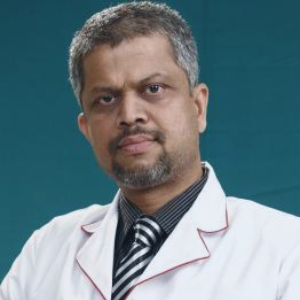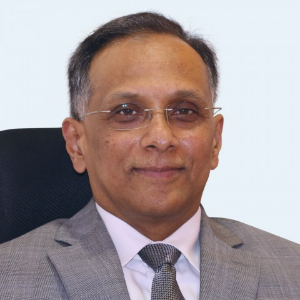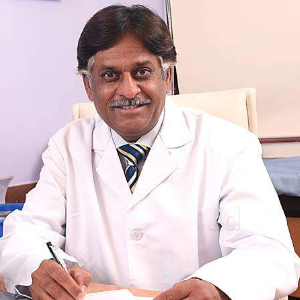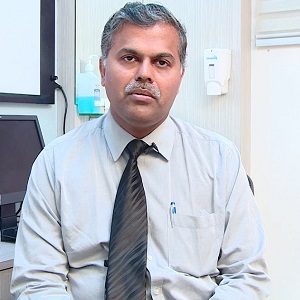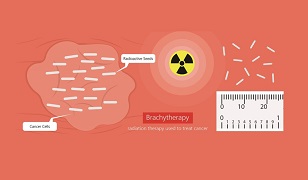Best Neurosurgeons in India for Brain Tumor Surgeries
Here are the most reputed Neurosurgeons in India for the surgical excision of all types of brain tumors.
- Neurosurgeon & Spine Surgeon, Mumbai, India
- Over 20 years’ experience
Profile Highlights:
- Dr. Rahul Modgi is a highly established neuro and spine surgeon in Mumbai specializing in all types of brain and spine surgeries.
- Dr. Rahul Modgi’s name has been recorded in the Limca Book of Records in 2014 when he removed the heaviest iron rod from the brain of a 17-year-old patient. He has also performed various other risky surgeries for which he has greatly appreciated.
- Neurosurgeon, Bengaluru, India
- Over 30 years’ experience
Profile Highlights:
- Dr. Rajakumar V Deshpande is a renowned Neurosurgeon in Bengaluru. He performed the first pedicle screw fixation surgery for a spine injury in Bangalore.
- Dr. D V Rajakumar specializes in endoscopic neurosurgeries and has performed some of the most complex brain and spine surgeries through the endoscopic approach. His other areas of interest include minimally invasive neuro surgeries, management of cerebrovascular diseases, and brain tumor surgeries.
- Neurosurgeon, Mumbai, India
- Over 20 years’ experience
Profile Highlights:
- Dr. Suresh Sankhla is an accomplished Neurosurgeon in Mumbai specializing in endoscopic neurosurgery and onco-neurosurgery.
- Dr. Sankhla acquired his training in neurosurgery under the guidance of the best trainers from well-known medical institutes and hospitals in Ireland, UK, USA as well as India.
- He has an equal interest in research and has published more than 100 articles, papers, and abstracts in renowned national and international peer-reviewed journals.
- Neurosurgeon, Chennai, India
- Over 25 years’ experience
Profile Highlights:
- Dr. M. Balamurugan is a well-known neurosurgeon in India with 25 years of experience.
- Dr. Balamurugan assists in managing Carotid Body Tumor Embolization, Brain Arteriovenous Fistula Embolization, Nerve and Muscle Disorders, Spinal and Cerebral Tumor Embolization, etc.
- Dr. Balamurugan is a life member of various prestigious associations and institutions.
- He also authored research studies or papers and articles for several publications.
- Neurosurgeon, Chennai, India
- Over 22 years’ experience
Profile Highlights:
- Dr. Srinivasan Paramasivam is a well-known Neurosurgeon in India having an overall experience of 22 years.
- He is associated with Apollo Hospital, Chennai as a senior consultant – neurosurgeon following his assignments abroad.
- Dr. Paramasivam earned a fellowship in Endovascular Neurosurgery from New York. He has 17 years of specialized experience in Neuro Interventional Surgery, Cerebral Angioplasty, Brain Tumor Surgery, Surgical Clipping, etc.
- Neurosurgeon, Gurugram, India
- Over 25 years’ experience
Profile Highlights:
- Dr. Pawan Goyal is a renowned neurosurgeon in Gurugram with 25 years of experience.
- He gained expertise in endoscopic neurosurgery, minimally invasive spine and neurosurgery, all brain and spine tumors, head and spine injuries.
- Neurologist
- Over 20 years' of experience
Profile Highlights:
- Dr. Praveen Gupta is one of India’s top Neurologists, who is currently serving as the Principal Director & Unit Head of Neurology at Fortis Memorial Research Institute, Gurugram.
- Over the course of his 23-years career, Dr. Gupta has made a lasting impact on the field of neurological treatment.
- Among his many firsts, Dr. Gupta founded the first-ever stroke centre in Gurugram and pioneered the use of single-arm mechanical thrombolysis, which completely changed the way strokes are treated in the area.
- He also pioneered Deep Brain Stimulation (DBS) treatments for Epilepsy and Parkinson’s disease, raising the bar for neurological care.
- Gupta has been the founder of two prestigious neurology departments at prestigious corporate hospitals, Artemis and Paras. He has consistently managed the highest possible number of both inpatient and outpatient cases, with an exceptional daily volume of 50 and 100 patients respectively.
- As a highly sought-after speaker, Dr. Gupta often contributes to the progress of neurological treatments and services by sharing his knowledge at national and international conferences.
Best Hospitals in India for Brain Tumor Surgeries
Paras Hospital, Gurugram
- City: Gurugram, India
Hospital Highlights:
- Paras hospital was established in 2006 and is the 250 bedded flagship hospital of Paras Healthcare.
- The is supported by a team of doctors of international and national repute.
- The hospital is NABH accredited and also the first hospital in the region to have a NABL accredited laboratory.
- The hospital provides specialty medical services in around 55 departments including Neurosciences, Joint Replacement, Mother & Child Care, Minimal Invasive Surgery, Gynecology and Obstetrics, Ophthalmology, Dermatology, Endocrinology, Rheumatology, Cosmetic and Plastic surgery.
- The hospital is equipped with state-of-the-art technologies.
S L Raheja Hospital, Mahim, Mumbai
- City: Mumbai, India
Hospital Highlights:
- SL Raheja hospital is a 140-bed multi-specialty tertiary care hospital that is being managed by Fortis Healthcare Ltd.
- The hospital is a benchmark in healthcare and medical facilities in the neighborhood of Mahim & the western suburbs.
- L.Raheja Hospital, Mahim has one of the most effective ICU and Casualty care services.
- The hospital provides specialty medical services in Cardiology, Oncology, Neurology, Orthopedics, Mother & Child Care, and in Diabetes.
Wockhardt Hospitals, Mumbai
- City: Mumbai, India
Hospital Highlights:
- Wockhardt Hospitals were established in the year 1973, originally called First Hospitals and Heart Institute.
- Wockhardt Hospitals are super specialty health care networks in India, nurtured by Wockhardt Ltd, India’s 5th largest Pharmaceutical and Healthcare company.
- Wockhardt Hospitals is associated with Partners Harvard Medical International, an international arm of Harvard Medical School, USA.
- Wockhardt Heart Hospital performed India’s first endoscopic heart surgery.
- The hospital has a state-of-the-art infrastructure equipped with the latest technologies and modern equipment.
- It has special Centers of Excellence dedicated to the major specialties to provide hassle-free and high-quality clinical care.
Pushpawati Singhania Hospital & Research Institute, New Delhi
- City: New Delhi, India
Hospital Highlights:
- Established in 1996, Pushpawati Singhania Research Institute is one of the top hospitals in the NCR region, as well as one of the top facilities in India for gastroenterology. The hospital is one of South Asia’s first institutes in medical and surgical treatment for diseases related to digestion.
- The hospital is equipped with state-of-the art facilities coupled with the latest equipment as well as renowned consultants from various parts of India as well as other parts of the world.
Indian Spinal Injuries Center, New Delhi, India
- City: New Delhi, India
Hospital Highlights:
- The Indian Spinal Injuries Center (ISIC), provides state-of-the-art facilities for the management of all types of spinal ailments.
- Staffed with internationally trained, acclaimed, and dedicated spine surgeons, the hospital provides cutting-edge medical & surgical technology. The hospital provides comprehensive management of spinal injury, back pain, spinal deformities, tumors, osteoporosis, etc.
- The hospital performs motion-preserving spine surgeries including disc replacement and dynamic fixation, and minimally invasive spine surgeries such as endoscopic disc excision.
- The orthopedic service of the hospital covers all orthopedic ailments including trauma, joint diseases & replacements, oncology, pediatric orthopedics & upper limb ailment.
W Pratiksha Hospital, Gurgaon
- City: Gurugram, India
Hospital Highlights:
- W Pratiksha Hospital, Gurugram, is one of the best hospitals in the NCR region. It is also a top hospital in India for IVF. Since its inception, the hospital has performed over 5500 successful IVFs. The hospital also specializes in gynecology.
- With over 20 years of experience in providing quality healthcare, the hospital is known as one of the most trusted and valued health providers in India.
- Equipped with world-class medical facilities and advanced technology, the hospital’s doctors and clinicians also have a track record of delivering excellent results. The hospital is also known for focusing on preventive well-being as much as on curative treatment.
- The hospital has earned the trust of its patients, by providing the best available treatments at affordable costs.
Narayana Superspeciality Hospital, Gurugram
- City: Gurugram, India
Hospital Highlights:
- Situated near DLF Cyber City, Gurugram, Narayana Superspecialty Hospital is one of the top medical facilities in the Delhi NCR region, catering to the needs of the people. Known for its commitment to quality medical care and patient service, the hospital is a state-of-the-art facility with planned and well-equipped sections, which includes a spacious OPD area as well as comfortable patient rooms.
- It is the closest super-specialty hospital from Indira Gandhi International Airport towards Gurugram, and also the nearest super specialty hospital from DLF Cyber City. It is also close to major residential areas in Gurugram.
- It is part of the renowned Narayana Health Group. Established in 2000, by Dr. Devi Shetty, a renowned cardiac surgeon, it has grown to be one fo India’s leading healthcare groups.
Sir Ganga Ram Hospital, New Delhi
- City: New Delhi, India
Hospital Highlights:
- Sir Ganga Ram Hospital, New Delhi is known to provide the latest medical procedures with the latest technology in all of its units.
- The hospital has a team of reputed doctors, nurses, and healthcare professionals that ensure that patients receive quality care at affordable costs.
- Staffed with a team of highly qualified doctors, dedicated nurses, and paramedical and non-medical staff, the hospital aims to lead in healthcare delivery, medical education, training, and research.
- As per the vision of the founder, the hospital also provides free treatment to the economically weaker sections of society.
- Sir Ganga Ram Hospital also provides training to young doctors under the Diplomate in National Board(DNB) program. The DNB program at the hospital was started in 1984 and it is known for currently running the maximum number of DNB specialties in the country. It also has the distinction of having the first bone bank in India.
KIMS Hospital, Hyderabad
- City: Hyderabad, India
Hospital Highlights:
- KIMS Hospital (a brand name of Krishna Institute of Medical Sciences) is one of the largest and best multi-speciality hospitals in Hyderabad. The hospital provides various treatments to an enormous number of patients.
- The hospital has a capacity of more than 3000 beds. KIMS Hospitals offers different healthcare services in more than 25 specialities and super specialities.
- The hospital is equipped with modern medical equipment and technology. It has robotic equipment to provide minimal invasive techniques for patients.
- The hospital is aimed at providing world-class healthcare facilities and services at an affordable cost for patients.
- The various specialities and departments of the hospital include neurosciences, gastroenterology & hepatology, robotic science, reproductive sciences, dental science, oncological sciences, organ transplantation, heart and lung transplantation and mother and child care.
Fortis Hospital, Shalimar Bagh
- City: New Delhi, India
Hospital Highlights:
- Fortis Hospital in Shalimar Bagh is a multi-super specialty hospital that strives to provide world-class patient care by leaving no stone unturned.
- Fortis, Shalimar Bagh, with 262 beds and a 7.34-acre footprint, provides the best level of medical care through its team of doctors, nurses, technicians, and management professionals.
What are Brain Tumors?
Brain tumor is a medical condition caused by a lump or a mass formed inside the brain. The cells in our body are constantly multiplying and growing, replacing the old, existing cells with new ones. In case of a brain tumor, the cells in the brain start multiplying and dividing in an uncontrolled manner which is not naturally recognized by the body. This rapid cell multiplication is different than how normal cells react which is primarily why these cells risk a chance of being cancerous in the long run.
There are approximately 130 brain tumor types that have been identified based on the type of cell multiplication, the particular location where the cell multiplication takes place, and on how quickly they can multiply.
The rapid multiplication of the brain cells gradually starts destroying the healthy brain cells and the spread of the unnaturally dividing cells are known to be one of the primary causes why the cancer condition formed originally in the multiplying cells can spread over time.
How unnatural Cell Multiplication affects the Brain
The brain is a soft, mushy, muscle cooped up inside and protected by the hardened skull. Rapid cell multiplication in such a restricted place, along with the infinite growth and spread of the unnaturally multiplying cells starts destroying the healthy cells in the brain that are responsible for basic functionality and emotions. This leads to brain damage or brain-dead risks. The multiplying growth in the restricted place also causes unnatural pressure in the brain, one of the primary reasons why brain tumor patients may often suffer brain damage or complete or partial brain paralysis.
Causes of Brain Tumors
Although it is difficult to find exact causes of brain tumors, following are considered major risk factors of brain tumors.
Family History & Heredity
Conditions like brain tumor can be passed on by generations and hence your family history or the presence of brain tumor or cancer running in your family can greatly affect your chances of getting a brain tumor. The cells in our body are filled with DNA, which is a chemical compound that makes our genes. The genes determine how the cells will function and a change in DNA inside the cells may cause the rapid cell multiplication to occur.
There are primarily two types of genes in our body-
- The oncogenes which are responsible for healthy growth and multiplication.
- The tumor suppressor genes that help keep the cell division under control by making the existing cells die so that the new healthy cells can replace them.
Brain tumor or possible cancer risks are caused when by either the oncogenes turning on or the tumor suppressor genes turning off causing an imbalance in the brain.
Past Medical Conditions
The risks of getting brain tumor is higher if you’ve suffered from cancer in the past. Medical science says, cancer cells stay dormant for years and may suddenly start reacting which is why the presence of cancer in your body once could be one of the primary reasons why rapid cell multiplication or spread of a dormant cancerous cell can still react in a different time. Usually, patients with leukaemia or non-Hodgkin Lymphoma as an adult may risk possible brain tumor conditions later in their years. This also includes childhood cancer conditions.
Exposure to Radiation
Repeated exposure to radiation can be one of the reasons for brain tumor. This can be due to a workplace hazard or due to chemo or radiation therapy as a part of the cancer treatment module. Repeated imaging tests like CT scan or MRI too can trigger this condition.
There is yet another type of radiation that we are all exposed to. Mobiles and power lines emit non-ionising radiation. The radiation in these are much lower and subtle than X-Ray or MRI radiations. However, repeated usage for a prolonged period of time can gradually lead to a possible case of brain tumor.
Low Immunity
Age
Obesity
Signs and Symptoms of Brain Tumors
Brain Tumor can either be malignant (cancerous) or benign (non-cancerous) based on the location, spread, and the multiplication rate of the cells. The tumor in the brain may often go unnoticed (without showing active symptoms) in many cases. However, most patients experience symptoms or signs that on diagnosis may reveal a possible brain tumor condition.
Symptoms can either be general or specific.
In case of general symptoms, the tumor’s growing size or spread often causes a pressure condition in the brain or spinal cord which reflects in the form of general symptoms.
On the other hand, a specifics symptom is experienced when a specific part of the brain gets deeply affected by the tumor, which causes repeated symptoms in the specific area. Both symptom types have to be diagnosed clinically to determine whether an active or passive brain tumor is present or not.
General Symptoms of Brain Tumors
Headache
Headache is one of the most common types of brain tumor symptom with almost 50% of patients experiencing changing headache patterns in the initial stages. This is primarily caused when the growing tumor puts pressure on the sensitive nerves and blood vessels in the brain. Patients often experience a change in their headache pattern in such cases, for instance,
- The headache can be more intense in the morning when you wake up
- The headache can be persistent with changing intensity throughout the day
- The headache may worsen if you exercise, change position, or cough
- Often symptoms like vomiting due to unbearable headache can occur
- The headache refuses to go away even after trying OTC medicines
However, not all headaches are a sign of a brain tumor. Sometimes, it can be due to an unhealthy lifestyle, late nights, and stress. If the headache refuses to go away, please visit a general doctor.
Personality Change
Brain tumors may cause unexpected mood swings and change in personality due to disrupted brain function. The most common personality changes will be in the form of
- Persistent irritation, even over small trivial matters
- Bipolar mood changes, for instance, you can be happy one minute and sinking in sadness the very next minute without any particular cause
- Lethargic attitude, procrastination, and reluctance to complete everyday tasks
- Change in attitude over something you used to love doing once, for instance, you may start hating your hobby.
- Frequent confusion over small matters
Personality changes are commonly observed if the tumor is present in one of the following locations in the brain:
- The Frontal Lobe
- The Temporal Lobe
- Part of Cerebrum
Seizures
Electrical impulses running through our nerves are primarily responsible for transmitting signals to and from the brain. Tumor in the brain pushes the nerves and the blood vessels to make space for itself which causes the disturbance in the electrical impulses leading to the medical condition we know as seizure.
This is yet another common brain tumor symptom with 50% of patients experiencing seizures as a result of a growing tumor. A tumor is also one of the early symptoms of brain tumor.
Memory Loss
The frontal lobe is usually responsible for reasoning or decision-making. A tumor in the frontal or parietal lobe may cause the following symptoms
- You may get easily confused. It starts with smaller things like directions and increases to names and people overtime
- You may experience difficulty in concentrating
- Your ability to multi-task or perform tasks quickly may get hampered
- You may experience acute forgetfulness. Short-term memory loss is also a possibility.
Mood Disorders
Mood disorders are slightly different than mood swings. In mood swings, you may experience a rapid change in mood, but in a mood disorder, the feelings are long-term and progressive in nature which often leads to self-destruction. Depression, anxiety can be a few mood disorders you experience. Usual mood disorders can be in the form of –
- Social anxiety
- Insomnia
- Loss of interest in things you used to like
- Feeling of self-worthlessness
Apart from these, other general symptoms may also include- a feeling of weakness, fatigue, nausea.
Specific Symptoms of Brain Tumor
Loss of Vision
Change in Speech, Reading and Writing
Trouble looking upwards
Loss of Balance
Lactation Problem in Women
Lactation problem in women due to pituitary gland tumor
Facial Numbness
If you’ve been experiencing any of these following symptoms for a long period of time without any progress or recovery in the condition, we suggest going to a neurologist for an in-depth analysis and performing some prescribed clinical tests to determine the underlying cause of the condition. In most cases, brain tumor is treatable if diagnosed and treated at the right time.
Types of Brain Tumors
A Brain tumor is typically caused by rapid cell multiplication in the brain. Often, tumors caused by this abnormal cell division starts spreading to neighbouring cells spreading the tumor as it progresses. There are primarily two categories of brain tumor, namely,
- Benign which is non-cancerous in nature
- Malignant which is cancerous in nature
Usually, a tumor spreading to the neighbouring regions is often considered an increasing sign of malignancy.
There are over 130 brain tumor types discovered by World Health Organization as of now, each classified and named according to the cell type they originate from. Brain tumors vary according to their size, shape, and region of origin. The most common type of brain tumors discovered as of now are-
Gliomas
A glioma is a type of brain tumor that originates in the glial cells of the brain, which are supporting cells primarily responsible for proper functioning of the nervous system About 30% of all brain tumors are classified under this category and 80% of the time, these cells can be malignant in nature.
Primarily, there four types of tumor producing glial cells which are classified based in their type and genetic features. The genetic features in these cells can be used to predict the behaviour or malignancy of the tumor over the course of time.
1. Astrocytoma
The tumor in this case originates in the cells known as astrocytes and can usually be found in the brain and spinal cord. These cells can either gradually grow into malignancy or can rapidly progress towards cancer. Seizures, headaches, or nausea can be common symptoms that are caused by Astrocytoma tumors.
2. Ependymomas
This tumor usually originates the ependymal cells present in the brain or spinal cord and may cause moderate to severe nervous imbalance since these cells are responsible for nourishment of the nervous system.
3. Oligodendrogliomas
This type of tumor originates in the oligodendrocyte cells which protect the nerves and the nervous system. These tumors can occur at any age and may cause excessive weakness or disability in the patient’s body.
4. Glioblastoma
Glioblastoma is a type of tumor that originates from astrocytes but are usually quite aggressively cancerous in nature. This condition is more common in older adults than children.
Craniopharyngioma
Craniopharyngioma are slow-growing tumors that typically form at the base of the skull or lower section of the spine. These type of brain tumor are more common in people between the ages 50-60 and are mostly benign in nature and are rare in nature, precisely making up 2% of all the primary brain tumor.
Medulloblastima
Medulloblastima is a malignant form of brain tumor which is mostly common in children aged 4-10 rather than adults. These tumor typically form in the cerebellum and is named after medulla, the bridge that connects the brain and the top part of the spinal cord together. Medulloblastima usually spreads from the location of origination and down the spinal cord.
Meningioma
Meningioma is a common intrcranial tumor which is usually benign in nature and constitutes about 10-15% of the brain neoplasms. Meninges, a membrane-like structure in our brain is where the tumor originally starts. Malignant meningioma is quite rare.
Pituitary Adenoma Tumor
Pituitary Adenoma Tumors are one of the most common forms of intracranial tumor right after gliomas and usually affect people between the ages 30-40. However, in some rare cases, this tumor type can affect children too but the good part is, these tumors can be successfully treated. Most of the pituitary adenoma tumors are fairly benign in nature and even if the tumor is malignant in nature, metastasis (spreading)to other parts of the body is fairly uncommon.
Haemangioblastoma
Haemangioblastoma are slow-growing tumors which are more prevalent in men than women. This tumor originates from the blood vessels in the cerebellum and is typically common amongst people between the ages 40-60. Haemangioblastoma are often big in size and may or may not be accompanied by a tumor. There are many other intricate brain tumor types. For detailed information, your doctor will perform diagnostic tests to determine the exact cause, location, intensity, malignancy, and curability of the tumor.
There are many other intricate brain tumor types. For detailed information, your doctor will perform diagnostic tests to determine the exact cause, location, intensity, malignancy, and curability of the tumor.
Brain Tumors Treatment
The treatment plan for a brain tumors depends on the size, type and location of the tumor in the brain, patient’s overall health and treatment preferences.
For benign (non-cancerous tumors), surgical or other forms of intervention to destroy the tumor are considered.
However, the treatment methodology involves radiation, chemo and other interventions in case of metastatic (cancerous) tumors.
Following are the treatment options for brain tumors also called Brain cancers.
Surgery
In Brain Tumor treatment, the first preference is always to remove the tumor.
Removing small tumors in less critical locations is easier. However, tumors located in critical and remote locations are challenging. In some cases, there is risk of harming vital functions like sight, hearing etc. Nevevertheless, neurosurgeons try and take out as much portion as possible for the tumor.
These days, top hospitals do minimally invasive Robotic Neurosurgeries which are able to do surgeries at remote locations with little or no damage to surrounding tissues.
Other Treatments for Brain Cancer
In addition to Surgery, often a combination of the following interventions is done for Metastatic Brain Tumors (Brain Cancers)
Chemotherapy
Chemotherapy is the use of anti-cancer drug that helps to slow or stop the growth of rapidly dividing cells that cause cancer. It prevents the growth of rapidly dividing cells by killing the dividing cells.
Despite its side effects, chemo is still the most widely used cancer treatment option. Unlike radiation and surgery which treats cancer cells at particular locations, chemotherapy drugs can kill cancer cells that have metastated (spread) to different organs in the body.
Radiation Therapy
Radiation Therapy is a kind of cancer treatment that uses high doses of radiation beams to kill cancer cells to shrink the tumors. Radiation kills the cancer cells by destroying the DNA. Cancer cells with damaged DNA fail to multiply and die. They are then removed by the body’s mechanism.
Brachytherapy
Brachytherapy is an internal beam radiation therapy technique where radiation seeds, the size of rice grains are placed in the location of tumor using a needle, guided by ultrasound imaging. The radioactive seeds keep emitting low dose radiation beams to the cancer over a long period of time. At one point, the seeds stop emitting radiation, but do not need to be removed.
Stereotactic Radiosurgery
Steretactic Radiosurgery (SRS) is an advanced form of radiosurgery where very high doses of radiation doses are beamed on a target spot using multi dimensional imaging. Stereotactic radiosurgery manages to damage cancer cells with minimal or no damage to surrounding healthy tissues. The well-known SRS options are:
- Linear Accelerator machines. Cyberknife is the most popular machine used today.
- Gamma Knife (less common today)
- Proton Beam Therapy: Advanced Intervention and available at select hospitals globally.
Immunotherapy
Immunotherapy (also called biologic therapy) is a new type of cancer treatment where the body’s immune system is boosted to help the body fight cancer by itself. Immunotherapy uses substances made by the body or in a laboratory to improve or restore immune system function.

